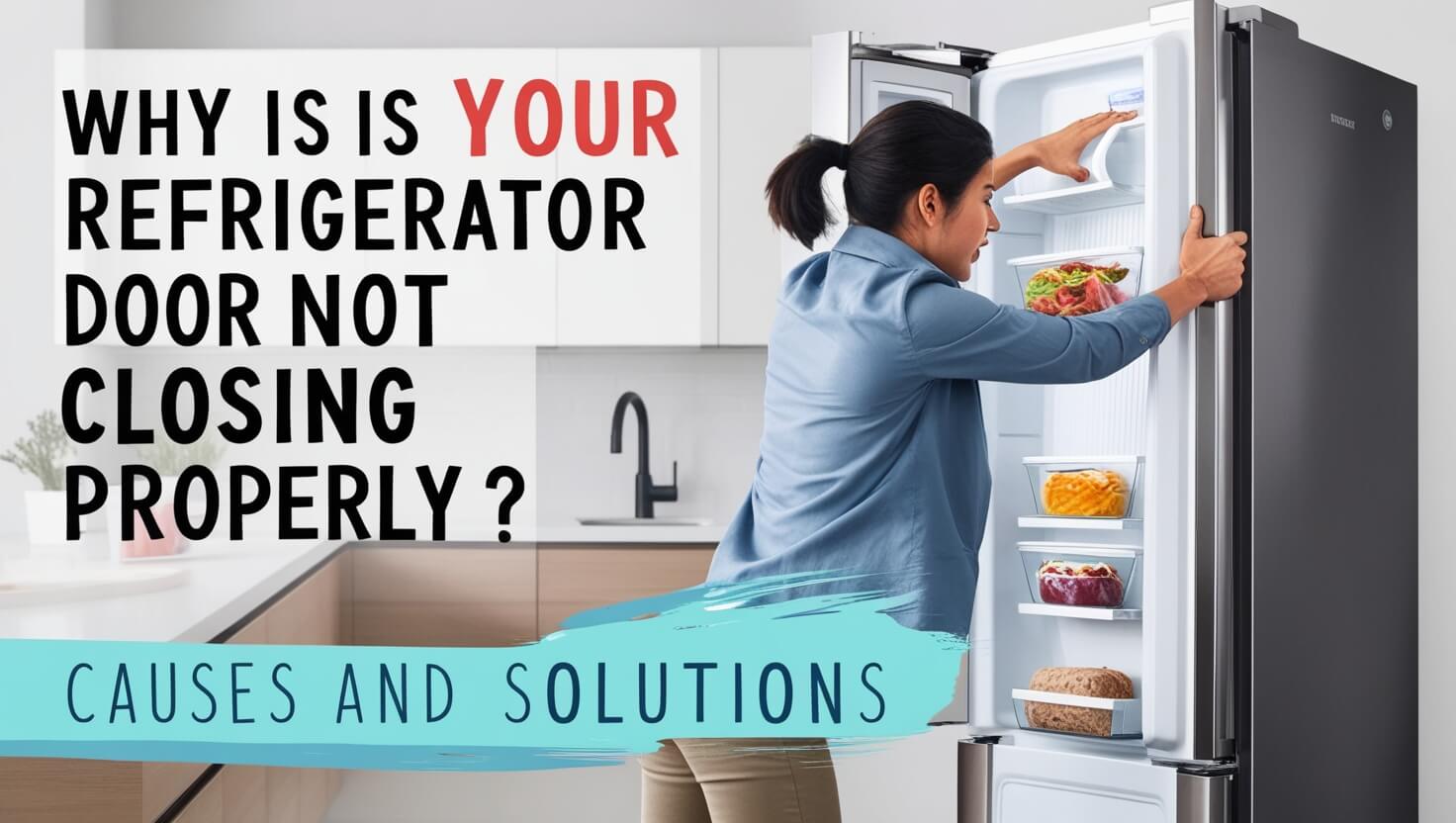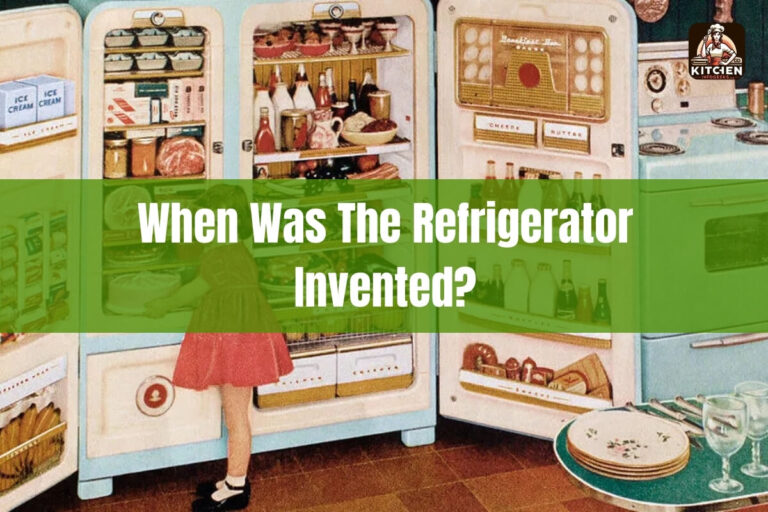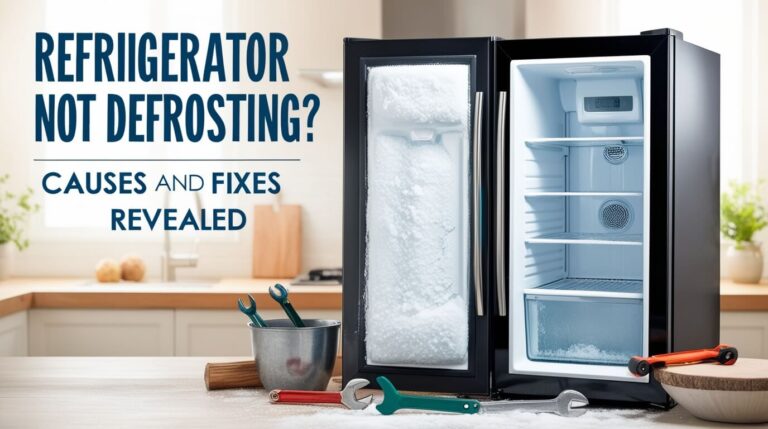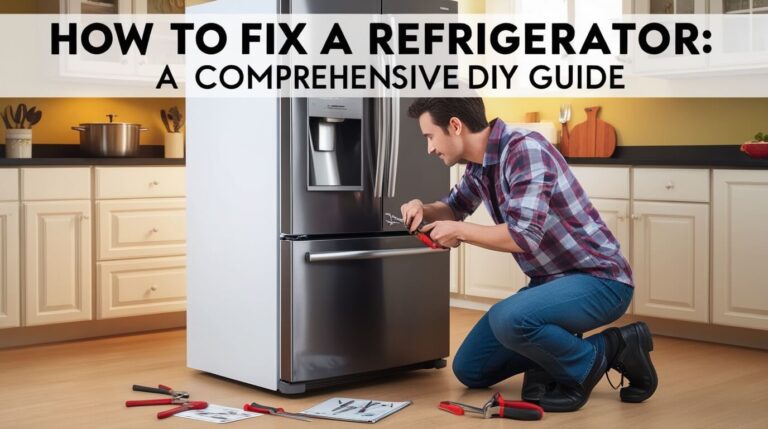
A refrigerator door that won’t close properly can lead to energy waste, food spoilage, and increased utility bills. Let’s explore why this happens and how to fix it.
Ever walked into your kitchen to find the fridge door slightly ajar? It’s more than just an annoyance – it’s a problem that needs fixing fast. From dirty gaskets to overloaded shelves, we’ll cover all the reasons your fridge might be giving you the cold shoulder. Plus, you’ll learn handy DIY fixes and know when it’s time to call in the pros.
Importance of a Properly Closing Refrigerator Door
Your fridge isn’t just a big box that keeps food cold. It’s a finely tuned machine that relies on a good seal to do its job right. When that seal is compromised, it’s not just your leftovers at risk.
Energy Efficiency Concerns
A fridge door that won’t close is like leaving a window open in your house – it lets all the cold air escape. This means your fridge has to work overtime to keep things cool. The result? Higher energy bills and a shorter lifespan for your appliance.
Did you know? A properly sealed refrigerator uses about 15% of your home’s total energy. Imagine how much that jumps when the door isn’t closing right!
Food Safety Issues
When your fridge can’t maintain the right temperature, it’s not just about warm soda. It’s about food safety. Bacteria love temperatures between 40°F and 140°F. If your fridge can’t stay below 40°F because of a faulty door, you’re giving those germs a five-star hotel.
Common Reasons for a Refrigerator Door Not Sealing Shut
Let’s dive into the culprits behind your rebellious refrigerator door.
Dirty or Damaged Door Gaskets
The gasket is that rubbery seal around your fridge door. Over time, it can get grimy, torn, or lose its magnetic properties. When this happens, it’s like trying to close a door with a sock stuck in it – it just won’t seal properly.
Misaligned Hinges
Fridge doors see a lot of action. All that opening and closing can throw the hinges out of whack. When the hinges are misaligned, the door won’t sit flush against the fridge body, leaving gaps for cold air to escape.
Uneven Refrigerator Placement
Is your kitchen floor as level as you think? An uneven floor can cause your fridge to tilt, making it hard for the door to close properly. It’s like trying to shut a car door when the vehicle is parked on a steep hill.
Overloaded Refrigerator Shelves and Doors
We’ve all been guilty of cramming one more thing into an already packed fridge. But overstuffing can prevent the door from closing fully. It’s not just about space – too much weight in the door bins can throw off the balance, making it harder for the door to seal.
How to Diagnose a Fridge Door That Won’t Close
Before you can fix the problem, you need to find it. Here’s how to play refrigerator detective.
Visual Inspection Techniques
Start by giving your fridge a once-over. Look for obvious signs of damage or wear on the gasket. Check if the door looks crooked or if there are visible gaps when it’s closed. Don’t forget to peek inside – is anything blocking the door from closing?
Testing the Door Seal
Here’s a neat trick: Close the door on a dollar bill, then try to pull it out. If it slides out easily, your seal isn’t doing its job. Repeat this test around the entire door to find weak spots.
Step-by-Step Solutions for a Refrigerator Door Not Closing Properly
Now that you’ve identified the problem, let’s fix it!
Cleaning and Maintaining Door Gaskets
A clean gasket is a happy gasket. Mix warm water with a drop of dish soap and gently scrub the gasket with a soft cloth or old toothbrush. Dry it thoroughly, then apply a thin layer of petroleum jelly to keep it supple.
Adjusting and Replacing Hinges
Loose hinges? Tighten them up with a screwdriver. If they’re bent or badly damaged, it might be time for replacements. Most hardware stores carry universal fridge hinges, but check your model number to be sure.
Leveling Your Refrigerator
Get yourself a bubble level and check if your fridge is sitting straight. Most fridges have adjustable feet – twist them until the bubble is centered. Pro tip: The front should be slightly higher than the back to help the door close.
Organizing Refrigerator Contents
Time to declutter! Remove everything from your fridge and only put back what you need. Use the door bins for light items like condiments, not heavy milk jugs. This helps maintain the door’s balance and prevents overloading.
When to Call a Professional for Fridge Door Issues
Sometimes, DIY just doesn’t cut it. Know when to wave the white flag and call in the experts.
Signs of Serious Door Closure Problems
If you’ve tried everything and that door still won’t stay shut, it might be time for professional help. Other red flags include strange noises, excessive frost buildup, or if your fridge is ancient (over 15 years old).
Choosing a Qualified Appliance Repair Service
Look for licensed and insured technicians with good reviews. Ask about warranties on their work. A reputable service will give you an estimate before starting any repairs.
Preventing Future Issues with Your Refrigerator Door
An ounce of prevention is worth a pound of cure, especially when it comes to appliances.
Regular Maintenance Tips
Mark your calendar for a fridge check-up every six months. Clean the gaskets, check the hinges, and make sure everything’s level. It’s also a good time to vacuum those coils at the back – it helps your fridge run more efficiently.
Best Practices for Loading Your Fridge
Think of your fridge like a game of Tetris – organization is key. Use clear containers to maximize space and visibility. Don’t block air vents with food, and remember: a full fridge is more energy-efficient than an empty one, but an overstuffed fridge is asking for trouble.
FAQs About Refrigerator Doors Not Closing Properly
How often should I replace my fridge’s door gasket?
With proper care, a gasket can last 5-10 years. If you notice tears, brittleness, or persistent sealing issues, it’s time for a replacement.
Can a refrigerator door that won’t close cause the compressor to fail?
Yes, it can. When the door doesn’t seal properly, the compressor works harder to maintain temperature, which can lead to premature failure.
Is it normal for my fridge door to be hard to open right after closing it?
Actually, this is a good sign! It means your door seal is working well, creating a slight vacuum. If it’s too difficult, check if your fridge is level.
Can extreme temperatures affect my refrigerator door’s ability to close?
Yes, especially if your fridge is in an unheated garage. Extreme cold can cause gaskets to harden and lose flexibility, while heat can cause them to warp.
How much energy am I wasting if my fridge door doesn’t close properly?
It varies, but you could be using up to 25% more energy. That’s a significant hit to both your wallet and the environment.
Conclusion: Ensuring Your Refrigerator Door Closes Correctly
A refrigerator door that won’t close properly is more than just a nuisance – it’s a problem that affects your energy bill, food safety, and the longevity of your appliance. By understanding the causes and implementing the solutions we’ve discussed, you can keep your fridge running smoothly and efficiently.
Remember, regular maintenance is key. Clean those gaskets, check those hinges, and keep an eye on how you’re loading your fridge. With a little attention, you can ensure your refrigerator door closes properly, keeping your food fresh and your energy bills low.
Don’t let a faulty fridge door leave you out in the cold. Take action today to fix any issues, and enjoy the peace of mind that comes with a properly functioning refrigerator. Your wallet (and your leftovers) will thank you!






